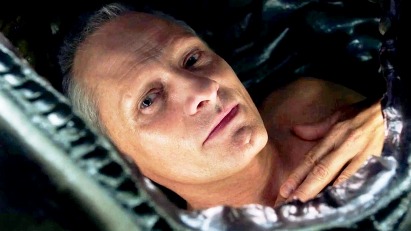An increasingly synthetic world creates the conditions for new human organs of unknown purpose to appear in the body, in David Cronenberg’s latest dystopian vision.

David Cronenberg pioneered a certain type of horror movie that came to be called “body horror.” Throughout his career, in such films as The Brood, Videodrome, and The Fly, he’s told stories that involve invasion, mutation, and experimentation of the human body. But even this notion of body horror is too narrow. It’s not about just fright or being scary, but a feeling of strangeness about being embodied itself. Human beings have altered the world in many ways, including ways that are bad, and in so doing, Cronenberg is saying, we also alter ourselves. Each of his films with this theme has reflected on the society and the era we are living in. With his new film, Crimes of the Future, he confronts us with the deadly poisoning of our environment, in a film of radical pessimism.
Cronenberg made a film called Crimes of the Future back in 1970, with a story that involved mutations, but otherwise is nothing like this new one. It’s not a remake or a sequel. I think he just likes the title, which implies crimes as inevitably following what has been done in our past and can’t be revoked.
This movie takes place in a future dystopia where medical advances have eliminated physical pain from human life. You might think that this would be a good thing, but one of the effects has been to make people more heedless of danger. Many are discovering that new organs are growing in their bodies, organs of unknown function created by some sudden process of evolution. Most, afraid of what may come, choose surgery to remove these organs. In this future, surgery has become almost thoroughly automated, with machines that make all the incisions and extractions just by someone touching a few buttons. And patients are awake during the process, since they can’t feel any pain.
Viggo Mortensen plays a man named Saul Tenser, who is continually growing new organs and has turned the operations into performance art. His partner, a surgeon played by Lea Seydoux, performs these operations in public where people gaze in fascination at whatever new organs she removes from Tenser’s body. He’s agreed to let a small research group, called the National Organ Registry, classify and keep track of all these organs, but this causes trouble when their work comes to the attention of a rogue scientist who wants to do a public performance of an autopsy on his dead mutated child.
Cronenberg’s view of our current situation is an extremely dark one, as you can tell. If you are grossed out easily by blood and guts and people getting cut up, by no means should you see this movie. Nonetheless, the film is not intended merely to shock. In a seductive, almost hypnotic style, and aided by Howard Shore’s ominous music, Cronenberg sends us a warning about our reshaping of the world, physically, morally, and politically. The near future we are shown here is in thrall to a sinister death cult. With the attainment of spiritual numbness, humans have succumbed to a kind of despair in which they’ll go to any lengths just to feel something, and especially pain. Saul Tenser uses a bizarre technological chair and bed that manipulate his body to keep him alive. These devices sustain, but also enslave him. The film reminds us that an immersion in the virtual represents estrangement from the natural.
Crimes of the Future is itself a kind of autopsy of our world predicament, a vision of solemn and unrelenting dread.

No Other Land, a film about the Palestinian struggle against Israel’s occupation of the West Bank, has been met with worldwide critical acclaim, multiple...

Emile de Antonio’s 1964 documentary about the Army-McCarthy hearings of ten years earlier, was one of the first directly political documentaries of any scope...

Jim Jarmusch presents three stories about parents and their grown up children. Jim Jarmusch started out as kind of an eccentric indie filmmaker, but...